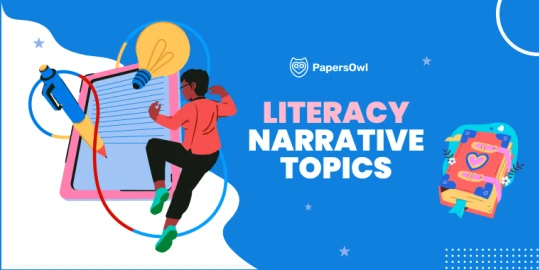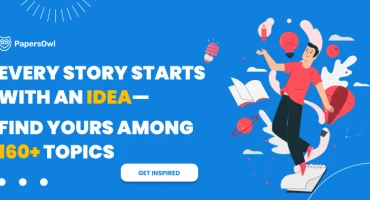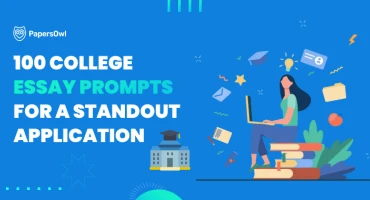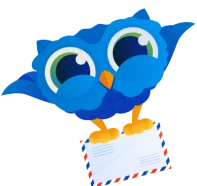This article provides a big collection of literacy narrative topics to inspire your writing. These themes matter because they let you share personal stories about learning, reading, writing, and digital life.
They also help you reflect on how words and ideas have shaped who you are.
⚡️ Key Takeaways:
- Explore 25 quick-start themes from your writing or reading life to spark your creativity.
- Use the big 2026 catalog of ideas, including reading, writing, media literacy, AI and social media, identity, school challenges, and mental health.
- Find a separate section on general narrative topics with a broader focus.
- Get a structure template, mini-samples, and professional prompts to guide your writing.
If you need dedicated guidance on developing and structuring these reflective pieces, seeking assignment help is a great option.
25 Inspiring Ideas for Personal Stories
What should you write about in your own story? Here are ready-to-use topics with short clarifications.
They connect to everyday life, personal growth, cultural background, and writing habits. These themes reflect moments that shape how you read, write, and see the world.
- The first storybook I loved (shows how early reading habits shaped who I am)
- My first diary entry (writing daily felt freeing and gave me a private space)
- A teacher who changed how I write (a valuable lesson that stayed with me)
- Losing myself in a library (a safe space that became key for self-discovery)
- Failing my first research paper (a turning point in essay writing and learning)
- Learning to write freely online (blog, fanfiction, or forum opened my voice)
- Best friend as a reading buddy (peer relationships supported my growth)
- A funny mistake in public speaking (humor made the real-life memory last)
- Trying to read in a foreign country (cultural identity struggles made me adapt)
- My family tradition of bedtime stories (storytelling passed down culture)
- A blank page that scared me (facing writing anxiety taught courage)
- Learning a new alphabet (a bilingual experience that shaped my skills)
- My first attempt at poetry (personal expression gave me new freedom)
- Street food and storytelling (daily life moments sparked creativity)
- The haunted house short story I wrote (creativity mixed with fear shaped my style)
- Discovering science fiction novels (a new world of ideas expanded my thinking)
- How texting changed my writing habits (daily life shifts changed my writing)
- The teacher who laughed at my essay (criticism turned into resilience)
- My future self as a writer (a personal growth goal I imagine)
- Learning from a random act of kindness story (a theme that left a lesson)
- The first time I published my work (a confidence boost that inspired me)
- Reading in a noisy classroom (focus and determination helped me succeed)
- A cultural background story that shaped my voice (heritage influenced my writing)
- Writing a letter that mattered (a personal connection through words)
- How I learned to tell a good story (a central theme that guided my writing)
Big Catalog of Literacy Narrative Titles to Explore in 2026
These themes reflect classic and modern experiences. They connect reading, writing, identity, school, family, and even digital or AI tools. Each title shows how everyday life can shape learning and self-discovery.
Below you’ll find cluster topics with short notes to guide your essay.
Reading Journey
These topics focus on books, libraries, and reading moments that shaped your thoughts and feelings.
- First book that made me cry (empathy lesson)
- Library as a second home (safe space + growth)
- Reading in a foreign land (comfort vs challenge)
- The short story that stuck forever (lasting memory)
- Street food and story books (daily life + culture)
- Favorite science fiction book (turning point for imagination)
- Reading aloud to siblings (family bond)
- Peer pressure to read “cool” books (identity shift)
- My haunted house reading experience (fear + fun)
- Graphic novels and self-discovery (new form)
- Book bans and censorship (conflict over access to stories + lesson on freedom)
- Storybook from childhood (future self shaped)
Writing Milestones
This section examines first attempts, struggles, and proud moments in writing.
- First attempt at a diary (self-reflection)
- Writing fanfiction online (community + voice)
- My blank page struggle (fear faced)
- A short story that made classmates laugh (humor + pride)
- College students’ first research paper (serious shift)
- Writing habits during exam stress (mental health link)
- A poem that revealed my hidden feelings (expression)
- Blogging as self-discovery (personal growth)
- First email to a professor (formal vs casual)
- Editing my own work (patience lesson)
- Writing letters to my best friend (connection)
- A writing contest that changed my confidence (growth)
Language & Identity
Here you’ll find narrative essay ideas by theme, including stories about culture, language, and how words shape identity.
- Growing up bilingual (cultural pride)
- Losing my accent in school (identity shift)
- Code-mixing in daily life (funny twist)
- Translation mistakes (lesson learned)
- Speaking a heritage language with grandparents (family link)
- Struggling to read in a foreign country (challenge)
- ESL student diary entries (personal record)
- Peer relationships through language jokes (bond)
- Discovering poetry in two languages (dual view)
- Writing about cultural background in class (heritage lesson)
- Losing words in translation (conflict)
- Language as a bridge in a foreign land (connection)
Media & Digital Literacy
These themes explore how media, the internet, and technology affect how we read and write.
- First time spotting fake news (critical skill)
- Social media algorithms are shaping my reading habits (impact)
- Learning from memes (fun lesson)
- Watching Hunger Games and media literacy (reflection)
- YouTube comments as a writing journey (expression)
- Digital storytelling vs storybooks (contrast)
- Online debates and narrative writing skills (growth)
- Writing skills shaped by texting (shift)
- Self-reflection after a viral post (lesson)
- Clip culture and short stories online (change)
- Peer pressure in digital spaces (identity shift)
- Comparing a real book with an eBook (contrast)
AI & Your Voice
This group of literacy narrative topic examples asks how artificial intelligence changes writing, creativity, and personal voice.
- Writing my first essay with AI (ethics)
- Learning prompts to improve writing habits (skill)
- Losing my own voice (conflict)
- AI as a writing buddy (support vs fear)
- Editing AI text into my own work (process shift)
- Keeping essay ideas authentic (self-check)
- Classroom debate on AI writing (critical view)
- AI vs personal stories (what feels real)
- First attempt at AI-assisted poetry (creativity)
- Ethics of plagiarism and tools (lesson)
- Research paper help from AI (conflict)
- Writing essays with AI and self-discovery (balance)
School & Teachers
These topics highlight lessons, challenges, and memories from teachers and classrooms.
- The teacher who inspired a turning point (mentor)
- Failing a narrative essay assignment (growth)
- Peer relationships in group writing (teamwork)
- Best high school debate moment (confidence)
- A failed retelling of a short story (humor)
- Teacher feedback that felt harsh (lesson later)
- First attempt at public speaking (fear vs growth)
- Reading aloud in class (fear + pride)
- The random act of kindness from a teacher (impact)
- Facing stage fright during a presentation (challenge)
- The essay that made my teacher smile (reward)
- Writing in detention (humor + lesson)
Family & Culture
This section of literacy topics connects storytelling to family traditions, cultural roots, and shared experiences.
- Family tradition of bedtime stories (bond)
- Migration story in my background (identity shift)
- A grandparent as a storyteller (wisdom)
- Cooking recipes as cultural literacy (connection)
- Cultural identity shaped by music and lyrics (expression)
- Reading stories in a foreign country (adaptation)
- Peer relationships across cultures (growth)
- Family letters as literacy events (bond)
- Celebrating holidays through storybooks (tradition)
- A haunted house tale from relatives (culture + fun)
- Street food stories and culture (daily link)
- Cultural background as essay theme (reflection)
Challenges & Breakthroughs
These ideas center on struggles in reading or writing and the following growth.
- First failed attempt at essay writing (lesson)
- Overcoming writer’s block (progress)
- Personal growth after stage fright (confidence)
- Struggling with grammar as a kid (challenge)
- Writing skills improved after criticism (shift)
- Peer feedback that stung but taught me (lesson)
- First attempt at publishing online (confidence)
- Fear of a blank page (struggle)
- Writing habits during anxiety (mental health)
- Turning point from failure to confidence (growth)
- Discovery after plagiarism accusation (ethics)
- Writing shaped by persistence (strength)
Mental Health & Neurodiversity
This part shows how writing can help with emotions, learning differences, and resilience.
- Writing as therapy for anxiety (healing)
- Journal entries during depression (expression)
- ADHD and writing struggles (challenge)
- Dyslexia and first reading success (victory)
- Narrative essay as a safe outlet (support)
- Writing about mental health (awareness)
- Family support in the writing journey (bond)
- Peer relationships and self-perception (growth)
- Future self and resilience (hope)
- School + mental health balance (daily life)
- Self-discovery through writing (reflection)
- Counselor’s advice as a turning point (guidance)
Literacy Narrative Topics by Level
Literacy narrative topics can differ depending on age, school stage, and writing skills. Each level comes with unique challenges and memorable moments, but all of them can follow a general narrative essay structure. Below are lists of themes for middle school, high school, college, and ESL learners.
Middle School Literacy Narrative Topics
- My first diary page
- Reading comics after homework
- Writing my own short story
- A funny spelling mistake
- Library adventures with friends
- Learning from a family tradition
- Peer relationships and note-passing
- Haunted house sleepover story
- Street food festival journal
- A good story told by my teacher
- The first book I ever finished alone
- Writing my first email
- Reading aloud in front of class
- My best friend recommending a book
- Winning a small essay contest
- A scary story that gave me nightmares
- Keeping a summer reading log
- Writing in my first journal
- The random act of kindness I wrote about
- Reading while traveling on a bus
- Trying to write a poem for the first time
- My favorite funny narrative essay topic
- A comic book that taught me more than class
- The first time I read to a younger sibling
- Writing about a family tradition at school
- Borrowing books from a friend
- A teacher correcting my handwriting
- A personal narrative topic I loved writing
- The first scary short story I read
- Peer relationships and reading groups
High School Literacy Narrative Topics
- First attempt at debate
- Peer feedback on my essay
- Narrative writing in English class
- Reading Shakespeare for the first time
- My research paper stress
- Discovering cultural identity in books
- Best narrative essay topics for teens
- Funny narrative essay about group work
- The teacher’s advice that felt harsh
- Self-reflection after failing a quiz
- Writing about a best friend in class
- A haunted house essay that made classmates laugh
- Family tradition explained in writing
- Street food described for homework
- Writing a short story for a contest
- The cultural background paper that surprised me
- First attempt at college essay writing
- Blogging for the first time
- Stage fright during speech class
- Writing a science fiction story
- A random act I turned into a story
- Peer relationships during writing groups
- Failing to finish a book on time
- Personal growth through debate writing
- Reading habits shaped by peer pressure
- A turning point when I started journaling
- Narrative essay ideas that came from music
- Reading a storybook in another language
- A short story I wish I wrote better
- My best friend editing my essay
- Daily life captured in social media posts
- The teacher who praised my personal essay
- The blank page during an exam
- Family migration story I had to write
- Cultural identity explored through accents
- Peer relationships shaped by texting
- The essay that got me a scholarship
- Writing skills improved after the plagiarism warning
- A life experience turned into a good story
- Self-perception shift after a class project
College and University Literacy Narrative Ideas
- Literacy journey in a foreign country
- Struggling with academic essay writing
- Narrative essay titles that shaped projects
- Peer feedback in workshops
- Blogging as self-discovery
- A valuable lesson from plagiarism
- Cultural background in a research paper
- Good narrative about mental health
- Storytelling in science fiction classes
- Writing narrative essays for an application
- My first attempt at a thesis statement
- Discovering my writing voice
- Peer relationships in seminar discussions
- Editing my own work for the first time
- Cultural identity explored in anthropology papers
- A blank page that made me panic
- Reading habits changed due to a heavy workload
- Funny narrative essay topics from dorm life
- Daily life written in a campus blog
- Struggling with a foreign language assignment
- Self-discovery in a creative writing class
- First attempt at publishing academic work
- Future self goals in writing skills
- Writing about my own life for a personal essay
- Peer relationships built through study groups
- Reading habits shaped by online research
- Writing habits under exam pressure
- Narrative writing about cultural background
- A haunted house event in a philosophy essay
- The teacher’s criticism that pushed me harder
- Editing feedback from a professor
- Valuable lesson from a failed research paper
- Personal essay about family tradition
- Good story told in a sociology paper
- Writing skills improved with practice
- Peer feedback on my first draft
- Funny narrative essay topics from group projects
- Daily life reflected in journal writing
- A turning point during freshman year
- The writing process improved by outlining
ESL and ELL Literacy Narrative Topics
- Writing a first letter in English
- My personal narrative about accents
- Story of learning slang words
- Reading habits in a new land
- Daily life writing struggles
- Family traditions told in two languages
- Own work in a second language
- Funny narrative essay topics with translation fails
- Future self with new writing skills
- A turning point in English classes
- Struggling with spelling in class
- Peer relationships across languages
- Reading aloud in front of classmates
- A diary in my second language
- Personal growth through bilingual writing
- Family migration story retold in English
- Cultural background expressed in essays
- The blank page in English class
- Peer feedback that felt supportive
- My first attempt at poetry in English
General Narrative Topics
This section gives you a wide range of ideas beyond just reading and writing experiences. These prompts explore personal growth, relationships, school life, digital experiences, and culture.
Personal Growth
These topics are about learning, changing, and becoming a better version of yourself
- The moment that changed how I saw myself
- Discovering a hidden talent for the first time
- Learning something valuable from failure
- Finding confidence through writing
- My journey of overcoming stage fright
- A small act of kindness I’ll never forget
- Making a hard choice and reflecting on it
- A time I felt proud of my work
- How daily journaling helped me grow
- The book that shifted my view of life
Relationships
These ideas focus on friends, family, and those who leave a mark on us.
- A best friend who shaped my life
- Meeting someone who inspired me
- A story my grandmother once told me
- A small act that deepened a friendship
- A teacher who truly believed in me
- A funny memory of sibling rivalry
- The turning point in my first relationship
- Favorite memories with my best friend
- Feeling part of a team for the first time
- A story about trust and betrayal.
School Life
These themes bring back memories of classrooms, teachers, and lessons learned.
- A teacher’s comment that shaped my skills
- Writing the essay that made me proud
- A funny classroom accident or mishap
- The stress of exam preparation
- My favorite school trip
- The short story I wrote for English class
- A haunted house tale told in literature class
- Friendships built in study groups
- The first time I actually enjoyed reading
- Learning from mistakes in an assignment
Digital Life
Here, the focus is on how technology and online spaces shape our stories.
- How texting changed the way I write
- A funny autocorrect fail I’ll never forget
- Writing my first blog post
- Sharing a story in a group chat
- Friendships built online
- Writing fanfiction for the first time
- Realizing I overshared online
- Learning from a tough digital comment
- Creating my first online diary
- A digital story that inspired me
Culture and Identity
These topics let you explore your origins and how it shapes your identity.
- Writing about my family’s culture
- A book that helped me explore identity
- A personal essay on migration stories
- A cultural tradition we studied in class
- How language shaped how I see myself
- Writing about food traditions
- Accepting my accent as part of me
- A funny mix-up between two languages
- Daily life shaped by rituals
- Storytelling as a way to keep tradition alive

Professional Literacy Narrative Prompts
Discover these professional reflective prompts validated by academic writing course practices (University of Illinois Writing Program).
Each one is built around the literacy narrative definition and follows a simple formula:
Moment/context → literacy barrier → action/resource → consequence for practice
Use them to reflect on professional growth in different fields.
Education
- First lesson plan → trouble with clear instructions → peer feedback → better classroom control.
- Group project → confusing sources → librarian support → stronger teaching material.
- Student misread assignment → revised rubric → smoother grading process.
- Parent conference → language barrier → translator tool → improved communication.
- First observation → unclear notes → mentor guidance → sharper teaching focus.
Healthcare
- Patient chart → hard medical terms → glossary check → faster care.
- Training session → heavy reading → study group → stronger skills.
- Clinical note → unclear writing → supervisor edit → safer treatment.
- Health form → language gap → interpreter help → better patient trust.
- Research paper → dense journal → outline method → clearer practice.
Engineering / IT
- Code review → unclear comments → team guide → smoother teamwork.
- Project manual → jargon overload → simplified draft → faster builds.
- Client email → vague terms → template use → clearer deals.
- Data chart → misread labels → peer review → cleaner design.
- Online forum → unclear question → rewrite post → useful replies.
Business / Marketing
- Ad draft → mixed tone → style sheet → stronger campaign.
- Sales pitch → weak story → case study → better client trust.
- Team memo → skipped detail → checklist → smoother project.
- Report draft → messy numbers → table format → clear decisions.
- Social post → poor reach → trend study → stronger impact.
Media / Journalism
- Interview notes → unclear quotes → recorder use → accurate story.
- First article → weak lead → editor feedback → stronger intro.
- Press release → jargon heavy → plain rewrite → wider reach.
- Story pitch → vague angle → headline test → quicker approval.
- Research task → fake sources → fact-check tool → credible news.
What Is a Literacy Narrative Essay?
This term is applied to a personal story about reading, writing, or communication experiences. It shows a literacy event, reflection, and change. Unlike a general narrative essay, it focuses on how writing, language, or media shape your own life.
Literacy Narrative vs Narrative Essay
| Feature | Literacy Narrative | Narrative Essay |
| Focus | Reading, writing, communication | Any life event |
| Goal | Show how literacy shaped growth | Tell a story with a lesson |
| Scope | Personal experience + reflection | Broader life experience |
| Genre Markers | Literacy event → Reflection → Change/Conclusion | Event → Description → Lesson |
| Examples | Difficulty with reading turned into a love for stories.
Writing in a second language Exploring cultural identity through bilingual stories Learning media literacy from social media Writing a first report at work |
Family trip that taught patience
Haunted house that revealed courage Best friend’s memory about trust Losing a game and learning teamwork Moving cities and adapting to change |
How to Choose a Topic?
Picking the right topic makes your literacy narrative stronger and easier to write. Focus on moments that shaped your reading, writing, or communication skills. Try these quick exercises to find ideas:
- First / Last / Turning Point – Recall your first or last experience with a book, essay, or speech, or a moment that changed your literacy habits.
- “Unresolved Question” – Think of when you were confused or curious about a skill and how you resolved it.
- Learning Mistake – Remember a mistake that taught you something important.
- Mini Reflection – List small daily events where reading or writing made a difference.
Checklist for a good topic:
focus → conflict → shift → lesson → readability
A strong topic is clear, shows a challenge or turning point, demonstrates how you changed, teaches a lesson, and is easy to follow.
Topics to avoid:
- Too broad – the story becomes vague and hard to focus.
- A book without personal experience – just a summary, no reflection.
- “White noise” about technology – listing apps or devices without a personal story.
- Overly dramatic events with no lesson – feels forced and shallow.
- Recycled clichés – generic topics that don’t show your unique voice.
Outline & Structure Template
A precise structure helps your story flow and keeps readers engaged. Here are three options for organizing your literacy narrative essay outline:
1. Chronology.
Tell your story from beginning to end. Start with your first literacy memory and follow events in order.
2. Braiding (Two Threads).
Combine two storylines, like school learning and home experiences. Weave them together to show connections and growth.
3. Scene-Reflection.
Focus on specific moments. Show the scene, add details, then reflect on what it taught you.
Paragraph Template:
- Scene → describe a key moment.
- Sensory Details → sight, sound, touch, smell.
- Micro-Reflection → what it taught you or how you felt.
- Transition → connect to the next moment.
Sample Theses:
- Learning to read in a new language taught me patience and creativity.
- Writing my first essay helped me find my own voice.
- Overcoming stage fright in reading aloud changed how I see challenges.
Sample Hooks:
- I still remember the smell of the library on my first day of middle school.
- The red ink on my essay made me feel like giving up – but I didn’t.
- That first book I read alone opened a world I never knew existed.
Literacy Narrative Essay Examples
Media Literacy
I once shared a news post without checking the source. A friend later told me it was fake. I felt embarrassed but curious. That moment became my first real lesson in media literacy.
I started questioning every article, every “fact,” and every video I saw. Slowly, my habits changed. I learned to slow down, check sources, and think critically. Over time, I became more careful online.
This literacy journey wasn’t about books or essays. It was about learning to see through media noise and understand the difference between real information and misleading content.
AI & Voice
The first time I used AI to draft an essay, I felt amazed. The words came fast, smooth, and clear. But soon, I noticed something missing. The sentences didn’t sound like me. They felt too perfect, too flat. That moment became a turning point.
I decided to use AI only as a tool, not as my voice. I started editing, rewriting, and adding personal stories. I reflected on my experiences and added my own perspective. Slowly, my writing skills grew stronger. The AI helped with ideas, but my own life and stories had to lead.
I learned that tools are useful, but authenticity comes from me. Writing became more personal, meaningful, and real.
References & Further Reading
- Literacy Narratives (Kennesaw State University Writing Center)
- Narratives as Pedagogical Tools in Writing Consultation by Jeffrey G. Howard
- Digital Archive of Literacy Narratives (DALN)
- LibGuides: Literacy Narrative (USC Upstate)






